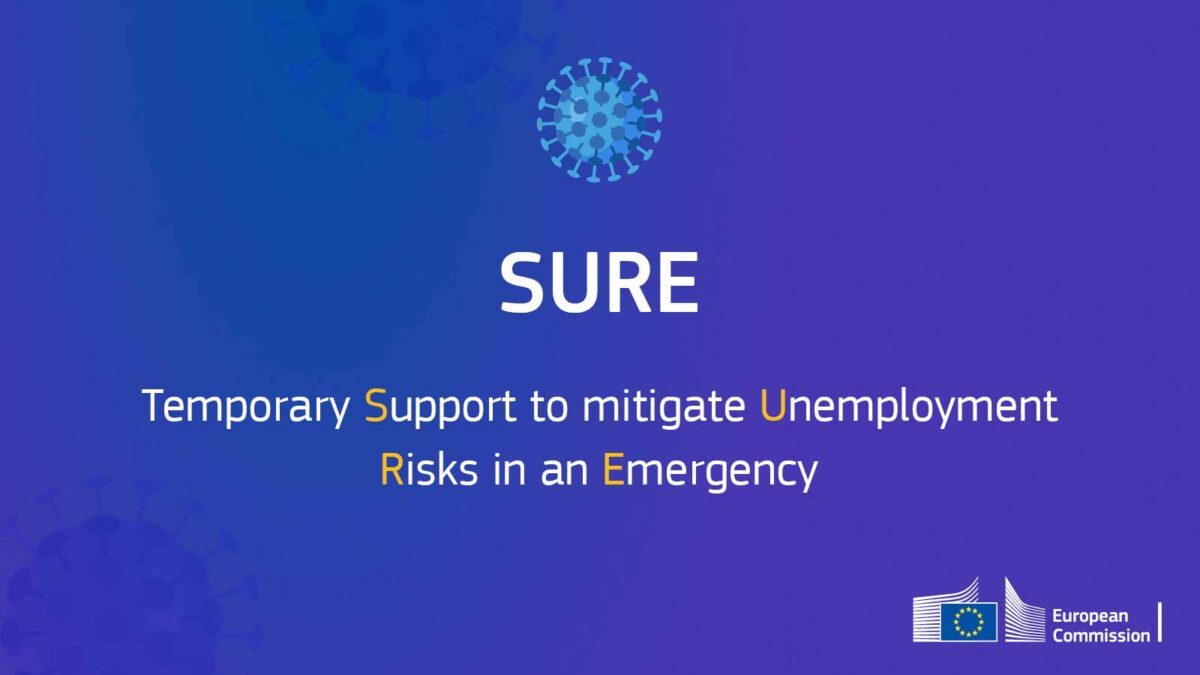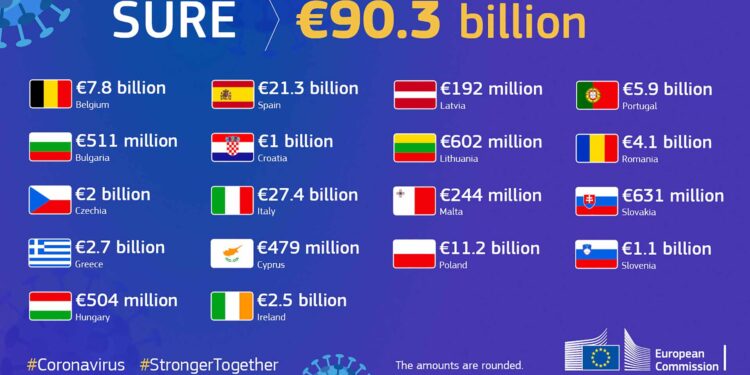The EU provides additional financial support to member states to protect jobs and workers affected by the coronavirus pandemic. The initiative is part of a set of EU measures to help member states tackle the coronavirus pandemic.
Many businesses are experiencing economic difficulties as a result of the Covid-19 crisis and have had to temporarily suspend or substantially reduce their activities and the working hours of their staff. To support employers and to protect workers and the self-employed from losing their jobs or incomes, the European Commission proposed a new temporary instrument called Sure (Support to mitigate Unemployment Risks in an Emergency), to complement national efforts to protect employment. The instrument activated on 22 September 2020.
What is SURE?
SURE is the temporary Support to mitigate Unemployment Risks in an Emergency (SURE). It is available for Member States that need to mobilise significant financial means to fight the negative economic and social consequences of the coronavirus outbreak on their territory. It can provide financial assistance up to €100 billion in the form of loans from the EU to affected Member States to address sudden increases in public expenditure for the preservation of employment. SURE is a crucial element of the EU’s comprehensive strategy to protect citizens and mitigate the severely negative socio-economic consequences of the coronavirus pandemic.
Protecting jobs during the crisis
During the crisis, the EU can provide financial assistance under the Sure programme in the form of loans granted on favourable terms to EU countries that request support. Assistance helps finance national short-time work schemes, unemployment benefits and similar job protection measures. Up to €100 billion is available to all 27 member states. The first instalments to member states made on 27 October 2020.
- Allow companies and businesses facing economic difficulties to temporarily reduce the hours worked by their employees, who then receive compensation for income loss from the member state
What is SURE? The three main advantages of EU SURE and the politics of #NEXTGenerationEU
Short-time work schemes allow families to maintain their incomes and continue paying their bills, while firms are able to protect production capacity and employees, ensuring market stability. In the longer term, short-time work schemes can prevent more severe consequences on the economy and help businesses recover faster after the crisis.
Welcoming the creation of Sure and calling on EU countries to implement it quickly, Slovak ECR member Lucia Ďuriš Nicholsonová, chair of Parliament’s employment committee, said: “It is an important expression of EU solidarity and a helpful instrument to mitigate the socio-economic effects of the Covid-19 crisis. By supporting short-time work schemes and similar measures, Sure will help companies experiencing economic difficulties to keep people in jobs.”
EU solution to support employment
Sure is a temporary instrument focusing specifically to tackle the consequences of the coronavirus pandemic. European Commission is also working on a new proposal for a European Unemployment Reinsurance Scheme to support employment and protect workers who lose their jobs due to economic shocks.
The European Parliament has said that such a basic unemployment benefit scheme would contribute directly to stabilising household income, thus strengthening the social dimension of Europe. A future European Unemployment Benefit Reinsurance Scheme aims to reduce pressure on EU countries’ public finances by providing support to national measures to preserve jobs and skills and to facilitate the transition back into work.
Specifically, the SURE instrument acts as a second line of defence, supporting short-time work schemes and similar measures, to help Member States protect jobs and thus employees and self-employed against the risk of unemployment and loss of income.

Loans under the SURE instrument
Loans provided to Member States under the SURE instrument are underpinned by a system of voluntary guarantees from Member States. Each Member State’s contribution to the overall amount of the guarantee corresponds to its relative share in the total gross national income (GNI) of the European Union, based on the 2020 EU budget.
The establishment of SURE is a further tangible expression of Union solidarity, whereby the Member States agree to support each other through the Union by making additional financial resources available through loans. The Council has already approved a total of €90.3 billion in financial support to 18 Member States. €53.5 billion has already been disbursed to 15 Member States. Other Member States can still submit requests to receive financial support under SURE which has an overall firepower of up to €100 billion.
The financial support is provided in the form of loans granted on favourable terms from the EU to Member States. These loans will assist Member States in addressing sudden increases in public expenditure to preserve employment in the context of the pandemic crisis. Specifically, they will help Member States to cover the costs directly related to the financing of national short-time work schemes, and other similar measures they have put in place as a response to the coronavirus pandemic, in particular for the self-employed. As an ancillary, SURE could also finance some health-related measures, in particular at the work place, used to ensure a safe return to normal economic activity.















